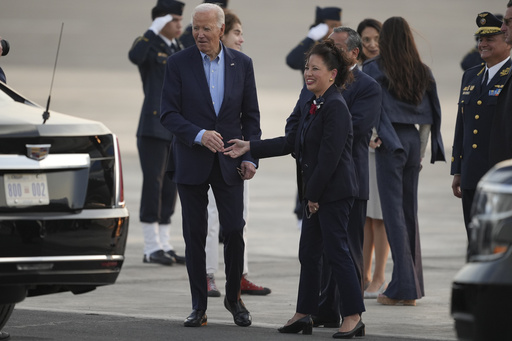LIMA, Peru — On a significant day for Peru’s unexpected leader, Dina Boluarte, the ongoing Asia-Pacific Economic Cooperation (APEC) summit in Lima propelled her into the spotlight, a rare occurrence for someone who has faced public scrutiny and a strikingly low approval rating of just 4%. Since assuming the presidency in December 2022 after the ousting of Pedro Castillo, Boluarte has been largely absent from the public eye, with local journalists noting that it has been over 100 days since she last engaged with reporters.
Boluarte, who previously served as a vice president and had minimal experience in political leadership, found her ascension to the presidency amidst significant turbulence. The chaos stemmed from Castillo’s failed attempt to dissolve Congress, which incited violent protests across the country, overshadowing the start of Boluarte’s administration. Her situation worsened in March, when suspicions regarding her financial conduct led to police raids at her residence, further eroding her limited popularity.
Recent polling by Ipsos indicated her approval rating has plummeted, marking an unprecedented low for any Peruvian leader in over 40 years. Despite growing discontent, lawmakers, benefiting from substantial salaries, have opted against pursuing impeachment but have effectively taken over many of her responsibilities, leaving Boluarte with little to address as public dissatisfaction rises.
Compounding her challenges, Lima has seen a surge in violent extortion from criminal groups, provoking public outcry from citizens who accuse the government of neglecting the escalating crime rate. Protests erupted across the country, notably in the southeast Arequipa region, leading to confrontations with police that left several injured. As world leaders gathered for the APEC summit, Lima residents seized the opportunity to vocalize their grievances about government indifference.
Public transport disruptions have paralyzed Lima after several bus driver strikes, primarily in response to violent crimes, highlighted the need for immediate government action. The administration declared a state of emergency while vowing a vigorous response, but the ongoing violence has intensified public anger towards Boluarte’s regime.
Taking precautions when exposing Boluarte to the international stage, the government designated the summit days as holidays and closed schools, effectively keeping children and civil servants off the streets to maintain order. In a last-minute attempt to manage public sentiment, authorities removed graffiti accusing Boluarte of murder from walls near the APEC venue.
Political analysts have criticized the government’s heavy-handed tactics, arguing that their overreactions reveal a crippling fear of civil unrest. Officials have publicly discouraged protests, with Prime Minister Gustavo Adrianzen stating it would be “regrettable” to witness conflict during the global summit. In response, Boluarte labeled the demonstrators as “traitors,” emphasizing her desire to present a united front to the world.
Nevertheless, protesters were adamant about making their voices heard amid the high-profile meetings. Amidst Boluarte’s official engagements, where she warmly greeted leaders like Chinese President Xi under a ceremonial backdrop, clashes erupted nearby between riot police and anti-government activists.
One protester, Betty Mendoza, expressed frustration with Boluarte’s attempts to showcase herself on an international platform, declaring, “She does not represent us. We did not elect her.” Protests escalated as masked demonstrators approached police lines, leading to confrontations that saw officers using batons against them, which resulted in several injuries.
Concerns about violence and stability resonate through the populace, as articulated by 54-year-old Freda Reyes, who shared her anxieties over the grim realities her community faces due to rampant crime. The parallels to past APEC events are evident, with protests igniting back in 2016 over worker dissatisfaction and limitations in public infrastructure.
In another troubling incident, a significant fire engulfed a multi-story warehouse near the presidential palace, generating thick smoke noticeable from the aforementioned red carpet where Boluarte was hosting a ceremony, underscoring persistent issues with Peru’s infrastructure.
In a time when Boluarte is attempting to establish her authority, the challenges ahead remain daunting, with public trust at an all-time low as the nation grapples with crime, governance, and an uncertain future.


